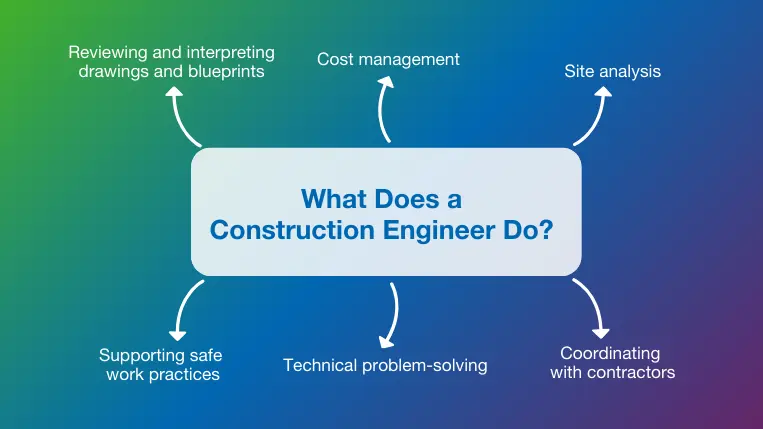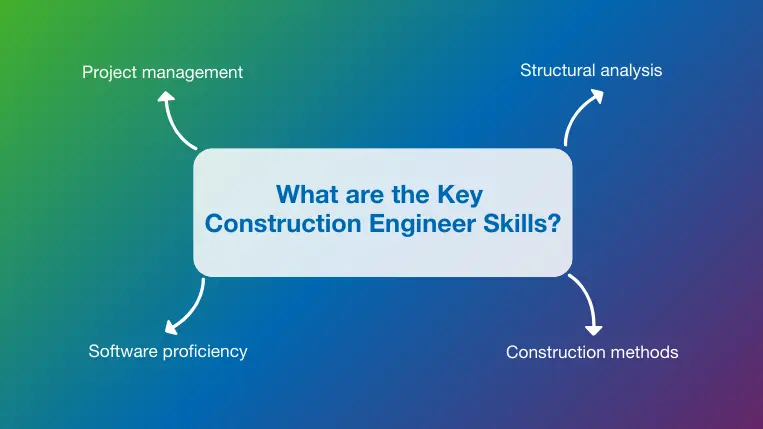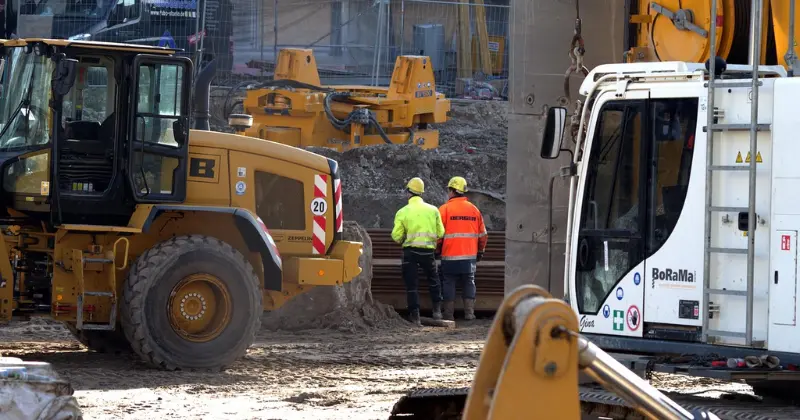11 mins read
Construction Engineer: Skills, Challenges, and Training Requirements for On-site Professionals

The influx of digital construction technology has brought new opportunities for designers, architects, and engineers in various disciplines and specialties. The construction engineer stands out among these experts by transferring their wealth of technical knowledge and experience from the office and classroom to the jobsite.
While the purpose and importance of this role is generally understood by other stakeholders in the industry, some construction engineers focus exclusively on structural and design issues, while others provide value through their understanding of sustainable building practices or materials science.
Key Takeaways
- A construction engineer is an educated professional who bridges the gap between the office and the field with responsibilities including cost management, site analysis, technical problem-solving, and the support of safe work practices.
- On-site engineers have become well-versed in new technologies and software platforms like building information modeling (BIM) that allow them to test ideas safely using virtual platforms.
- Essential engineering skills include project management, structural analysis, advanced building methods, and additional technical abilities based on their specialized training and education.
- Engineers have adopted construction software tools (e.g., RIB SpecLink, CX, and Project) to improve specifications, collaboration, and project management, either in the office or the field.
- Average salaries in the US are ~$110K, with high-demand cities, states, and countries offering significantly more, especially for engineers with advanced degrees and specialized experience.
- The various types of engineers now found on job sites include specialists in structural, environmental, transportation, and geotechnical engineering.
What is a Construction Engineer?
A construction engineer is a specialist who oversees the design and construction of large building projects. This key role often bridges the gap between civil engineers, contractors, and other stakeholders by interpreting design concepts and upholding quality standards.
Construction engineering falls under the general umbrella of civil engineering, with added focus on planning and execution, rather than design and development. Through experience and education, these engineers gain insight into the operational aspects of the industry, including construction resource management, equipment utilization, and general site management tasks that related engineering disciplines rarely encounter.
While civil engineering is closely related, on-site specialists can emerge from many of the 40+ engineering disciplines that now exist. Some of the best engineers rise through the ranks, learning valuable hands-on skills and terminology in the process, while others begin their journey in the academic world. All construction engineers share an interest in problem-solving, relationship building, and technology that allows them to be successful in highly dynamic environments.
What Does a Construction Engineer Do? Key Responsibilities

The construction engineer primarily ensures that tasks on the ground are completed in accordance with the expectations of designers, construction architects, and clients. Although the responsibilities vary according to the project structure and scope, the key duties can be broken into a few general categories.
Reviewing and interpreting drawings and blueprints
The on-site engineer frequently reviews design and structural drawings, specifications, and other technical documents, using their unique perspective to identify any issues that may cause problems during building, require specialized equipment, or add costs that clients, contractors and other stakeholders must be aware of. These engineers also look for any potential documentation issues related to code compliance or safety.
Cost management
Along with the project manager, estimator, contractor, and construction foreman, the engineer plays a vital role in managing costs throughout the project lifecycle. The unique combination of field and technical knowledge provides value during estimating and budgeting, and they also get involved in day-to-day cost tracking activities, as they identify variances or deviations from plan.
Site analysis
During the preconstruction phase, important site analysis tasks might include soil testing, environmental impact studies, zoning reviews, and drainage system design. Each of these activities requires a high level of expertise and can jeopardize project outcomes if performed incorrectly. The engineer helps to develop site analysis plans and strategies, and often oversees the specialists and contractors completing these essential tasks.
Coordinating with contractors
Experienced general contractors develop strong technical skills through their own training and experience, but collaboration with the engineer is still important to optimize work sequencing, clarify design and client intent, and accommodate structural design changes without introducing cost or safety risks. Open communication between contractors and engineers also creates a positive work environment, resulting in improved quality and schedule performance.
Technical problem-solving
Engineers of all types pride themselves on their problem-solving skills and practices that emphasize patience and fact-based conclusions. These skills are ideal for construction project engineers dealing with problems like material issues, equipment malfunctions, and design flaws that must be resolved quickly and precisely. These engineers often use advanced software and simulation tools like building information modeling (BIM) to test ideas and solutions before putting them into practice.
Supporting safe work practices
Engineers visiting the site daily also play a key role in maintaining a safe work environment, as they coordinate with the superintendent to identify and eliminate construction hazards, and collaborate with contractors to make potentially dangerous tasks safer. As drones, automation, and robotics evolve and improve, engineers are developing new practices to keep human workers out of hazardous situations and eliminate tasks that can lead to workplace injuries.
What are the Key Construction Engineer Skills?

Engineers working in this capacity require a variety of skills that combine their technical prowess with effective communication and team building to optimize results. Some of the most essential and valuable skills include:
Project management
The detailed planning, budgeting, resource allocation, and problem-solving activities that construction engineers encounter all require strong project management skills. Along with basic project management concepts and tools, leadership and collaboration skills allow engineers to gather the information they need and develop creative ways to save time and money.
Structural analysis
There are many areas of civil engineering knowledge that align well with the roles and responsibilities of on-site engineers, including geotechnical engineering, transportation engineering, and water management. Structural analysis skills are extremely useful, since this knowledge supports reliable structures and building practices, and gives engineers insight into the feasibility of proposed changes or material substitutions. Contractors and other on-site stakeholders rely on the engineer’s expertise for troubleshooting and risk management.
Construction methods
A combination of technical knowledge and planning expertise ultimately leads to the optimized selection of tools, methods, and equipment, and the efficient sequencing of individual tasks. A deep understanding of construction methods such as carpentry, concrete foundation pouring, roofing, and plumbing helps to bridge the gaps between concepts and reality when the plan is executed.
Software proficiency
Project management, cost control, resource monitoring, and design functions that overlap with the construction engineer’s roles and responsibilities all rely on specialized software tools to access current information and analyze data quickly. Proficiency in multiple software packages is a mandatory skill, and mobile apps and devices now allow engineers to carry these capabilities with them to the field.
Construction Engineer FAQs
As software and automation improve and construction jobs become more technically oriented, roles that require both engineering and organizational skills become commonplace. Common themes and questions have emerged as industry professionals seek to understand this unique role, and students consider careers in this rewarding, fast-paced industry.
What software do construction engineers use?
The wide variety of tasks and responsibilities assigned to construction engineers calls for a diverse software toolkit. This includes basic design and CAD software packages, as well as advanced tools for structural design and analysis. BIM management software is useful for compiling 3D design files, cost, schedule, and sustainability information in one collaborative model.
Integrated construction engineering software platforms have also evolved to support common tasks and decisions, improve change management, and share information in a structured environment. RIB construction engineering software solutions combine 2D/3D takeoff capabilities, scheduling, and cost estimation on a single platform. The fully integrated and modular tools also include:
- RIB SpecLink: This solution allows engineers and other experts to create specifications more efficiently, filter important decisions and technical aspects of the project throughout the documentation package, and synchronize changes easily.
- RIB CX: This software tool acts as a virtual communication hub, empowering engineers to oversee all facets of a project. Ready access to planning and design files also makes it easier for the engineer to review and distribute information efficiently.
- RIB Project: As a cloud-based document and project management software solution, RIB Project allows engineers to connect with dispersed teams across all disciplines. Intelligent workflows ensure information is automatically distributed to the correct parties.
Additional RIB Software tools for field & operations management, commissioning & handover, procurement, and maintenance leverage the same centralized pool of project information to simplify each task while improving awareness and collaboration.
How much does a construction engineer make?
Like most technical professionals in high demand, an engineer in construction can earn a great living, especially after gaining several years of experience and becoming established in their field. A construction project engineer salary can also vary significantly, depending on the specific location and current demand. For example, a construction engineer in the United States currently earns an average of USD $110,200 per year, but specific cities and countries pay significantly higher or lower.
There are many other factors that determine a construction engineer salary, including advanced degrees like a Master’s or PhD, and the company they work for. Expertise in emerging technologies like BIM or sustainable construction can also drive salaries higher, as businesses compete for a limited number of experts. With years of experience, promotions to the manager or director level can reset expectations for total compensation.
What is the function of a construction engineer on-site?
To understand the engineer’s role, it can be useful to review a typical day at the construction site, and some of the common activities they might take part in.
The day is likely to begin in the office with meetings to touch base with clients, designers, and architects prior to heading to the site. These meetings help the engineer stay informed on important changes, issues, or concerns. Once they arrive at the site, they might also be involved in:
- In-person meetings with contractors to exchange information, verify progress, and discuss any issues or roadblocks.
- Site inspections or walkthroughs to identify any new safety or quality issues.
- Coordination of material deliveries to ensure safe handling and storage methods are utilized, and items are inspected in accordance with their specifications.
- Direct oversight of key activities to ensure equipment is utilized according to plan and work items are executed correctly.
The unpredictable nature of the construction industry might find the engineer shuttling between the office and jobsite multiple times per day, traveling to a remote work location, or visiting key suppliers to perform source inspections or check on order status.
What are the types of construction engineers?
A construction engineer must have a broad range of skills and experience, no matter what their current assignment entails, but there is still room for specialization. Some of these niches include:
Structural
This common specialty focuses on the civil and mechanical engineering principles that ensure the structural integrity and safety of a building. While all construction engineers should be well-versed in this area, some choose to pursue additional training or education to build upon their base of knowledge.
Environmental
As the name implies, engineers who choose this specialty focus on environmental considerations like waste reduction, building efficiency, and green construction methods. This field continues to expand as more clients and customers look for sustainable building designs and materials.
Transportation
Many of the largest infrastructure projects in the UK, Asia, the US, and Australia fall into the transportation category. Engineers who support these efforts develop in-depth knowledge and experience related to railway design, tunneling processes, and cost-efficient highway and runway design.
Geotechnical
The site analysis and soil testing responsibilities common to many engineering roles can become a good entry into the field of geotechnical engineering. Since almost all structures interact with the ground in some manner, this expertise is valuable for both building and infrastructure projects.
How long does it take to become a construction engineer?
Construction engineering is an exciting and worthwhile career choice, but moving into these positions does not happen overnight. In fact, the process of becoming a construction engineer might take eight years or longer.
With some exceptions, most positions require a four-year degree in construction management, environmental science, civil engineering, or another related field. Advanced degrees improve the odds of breaking into the industry with a better salary and advancing quickly. Certification as a Professional Engineer (PE) or Chartered Engineer (CEng) is also highly recommended.
Unlike other engineering disciplines, prior field experience is also preferred, so many students seek out internships to gain practical experience as they study. Others may choose to return to the classroom after working in the industry for 3-5 years. With the renewed focus on software and technology, leading companies might offer free training programs or financial assistance to keep top talent in-house.
Conclusion
The construction engineer builds a bridge between design and execution as they collaborate with stakeholders in the office and field to reach a common goal. As digital construction becomes the norm and mobile technology removes the barriers between jobsites and software tools, engineers continue to benefit from integrated construction management software platforms.
RIB Software solutions ensure important tasks like bidding, estimation, cost management, resource allocation, and document control are optimized and streamlined, with purpose-built solutions tailored to the needs of each business, engineer, and project.
To discover more about the many ways RIB Software can accelerate tasks and drive success for busy construction engineers, get your free demo today and begin your journey towards optimized project execution!
Most Recent
11 mins read
11 mins read
10 mins read
10 mins read
Blog Categories

Ebook











